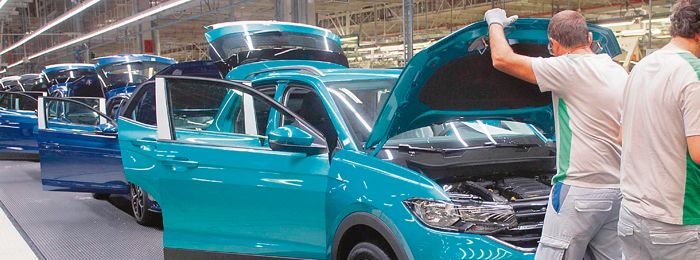
Anger mounts: Automobile manufacturing companies are aggregating in such prime demand destinations as India and the US.
Yogesh Gupta
Former Ambassador
Keith Krach, an undersecretary for economic growth, energy and environment in the US government, recently said in an interview that the Trump Administration is ‘turbocharging’ an initiative to remove global industrial supply chains from China as it examines various ways to ‘punish’ Beijing for its mishandling of the Covid-19 pandemic. These may include more tariffs and sanctions on China to push foreign companies to move outsourcing and manufacturing out of that country. A strong view is emerging, shared by many countries that they should not depend upon an authoritarian, unaccountable and insecure China with its unfair and opaque processes, for procuring essential goods and services.
The US is considering setting up an ‘Economic Prosperity Network’ (EPN) which will be a grouping of trusted partners like Japan, India, South Korea, Vietnam, Australia and New Zealand which will work on the basis of similar standards on everything, from digital business, energy, infrastructure, research to trade, education and commerce. This Quad (US, Japan, India and Australia) plus group would drive an agenda which would balance the economic, political and security imperatives so that the
member countries are not at the
mercy of Beijing for securing supplies in emergencies.
The immediate backdrop for this initiative has been the massive loss of lives and damage to the economies due to Covid-19 in the US, the UK, France, Italy, Spain, Japan, India and other countries. Many believe that this loss could have been considerably reduced had China shared the vital information about the pandemic with other countries transparently at an early stage and not allowed its five million nationals carrying the virus to travel to several countries before January 25 this year. The growing anger against China has been sharpened further by its ‘warrior diplomats’ who have gone all out to annoy the local governments by using the open threats of Beijing’s clout as a major trade partner.
The shifting of supply chains from China is an old phenomenon which started after 2008 as the global economy witnessed new rebalancing with several emerging economies becoming the latest engines of demand and multinational companies relocating supply chains in or around these markets. The expansion in trade in services such as telecommunications, information technology, business services and finance created a fresh set of supply chains. The increase of wages in China post 2008 and the escalation of tariff war between the US and China after 2018 further prompted many businesses to shift a part of the existing or new investments in countries outside China.
Various sectoral chains have reacted differently to the new political and economic conditions. The textiles, clothing and footwear companies are scouting for low labour cost countries. The automobile manufacturing companies are aggregating in or around the prime demand destinations such as China, India and the US. The electronics supply chains are centred primarily in high-tech locations such as the US, Europe, Japan, South Korea and Malaysia, though some have also relocated to Vietnam, India and Mexico.
China, however, remains a key overseas destination for many American and other foreign companies due to its unrivalled high-tech supply ecosystem. The supply chains in China, built over a period of 20 years or more, have vast networks of manufacturers and suppliers, fully tuned to the US quality control standards, on time delivery, safety certifications and production of large volumes. The US iPhone maker, Apple, has faced hurdles in diversifying its production beyond China due to the non-availability of highly skilled engineers, lack of high-value added and innovation-based suppliers who could offer competitive rates and the absence of reliable logistics, transport, infrastructure and utility services.
For these reasons, many companies will continue to retain a significant part of their manufacturing in China to tap the large Chinese market. Also, the demand for goods in many countries in the post-Covid-19 environment has sharply fallen and will take years to recover. Therefore, the setting up of green-field units will take time. Many business executives will keenly watch how the US-China rivalry under President Trump plays out further and if the former would be re-elected in the upcoming presidential elections in November 2020; the prospects of a mercurial Trump striking a new trade deal with China if the latter were to offer more economic incentives can’t be ruled out either.
Japan has already announced an initiative to set up a fund of $2.2 billion to encourage companies to move out of China. Given the hardening of bipartisan consensus in the US to probe China’s role in the pandemic and take punitive measures against it, the manufacturers of medical equipment, pharmaceuticals and other essential goods may relocate the production of these items in their own and friendly EPN countries. Such an initiative by the US will, undoubtedly, find resonance among the European countries and their allies in the other continents. It has the potential to sharply accelerate the shifting of supply chains from China, particularly those aimed at providing goods to the other countries.
The spurt in the relocation of supply chains from China will, undoubtedly, affect its economy (trade contributes about 40 per cent to its GDP), high-value jobs, purchasing power of its people and even its internal stability. It must be remembered that much of China’s economy prospered when it was an integral part of the global supply chains and the manufacturing capital of the world.
India is considering a number of steps to attract the foreign companies moving out of China. These include a reduction in corporate taxation to the lowest level in the region and assistance to the moving companies through the provision of land, utilities and essential infrastructure. There are, however, several weaknesses which India will have to address, such as low productivity of our industries due to outdated technologies, lack of an ecosystem of efficient suppliers who could manufacture quality goods at the required speed in large volumes and logistical and infrastructural constraints, besides membership of important trade groupings to emerge as a serious destination for supply chains relocating from China.
Join Whatsapp Channel of The Tribune for latest updates.




























